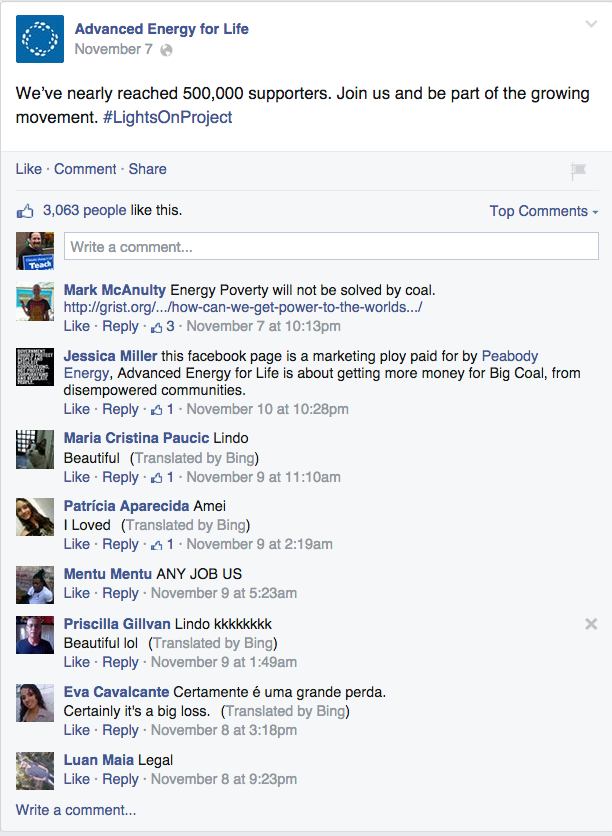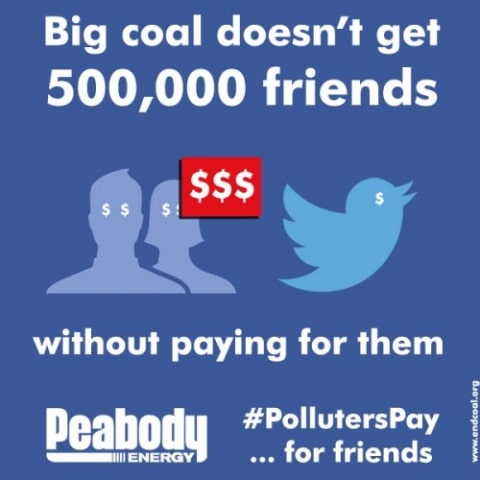On the fringes of Brisbane’s G20 summit inside the Queensland capital’s grand city hall, Peabody Energy president Glenn Kellow made a remarkable claim.
Almost half a million people in countries across the globe had supported his coal company’s PR campaign to urge the world to act on “energy poverty”, claimed Kellow.
Kellow was referring to the company’s “Lights On” project run under his firm’s Advanced Energy for Life (AEfL) campaign.
The AEfL campaign was created with the help of Burson-Marsteller, one of the world’s biggest PR firms and a specialist in crisis communications.
In a press release, Peabody Energy again claimed about “half-million citizens from 48 nations” had “urged G20 leaders” to have a greater focus on energy poverty through its campaign.
Peabody Energy, the world’s biggest privately owned coal company, has been the leading voice in the coal industry’s attempts to hijack the term “energy poverty” for its own ends.
While international agencies including the United Nations World Health Organization and the International Energy Agency agree that more people should have access to electricity and cleaner energy, they also urge action to reduce fossil fuel emissions.
The IEA says there are about 1.3 billion people in the world without adequate access to electricity, the majority of which live in sub-Saharan Africa and Asia.
Peabody Energy and other coal industry figures have latched onto the issue to claim the only way to bring the poor out of poverty is to give them access to “cheap” power from their coal.
The “Lights On” project appears to be little more than a name attached to some images and a video posted on the company’s website and social media channels.
But how did Peabody Energy manage to persuade so many people in so many countries to support a campaign with such an obvious corporate self-interest?
Did they get half a million answers on a survey? Did they run a giant petition project?
No.
A Peabody Energy spokesperson told DeSmogBlog that “those supporting the Lights On Project have liked our campaign on our social media channels” adding that “Burson is not involved in our social media campaign, though they and other firms have assisted us with elements of the AEFL campaign.”
Now questions are being asked about the legitimacy of the company’s campaign with accusations the firm paid online agencies so that people would “like” their campaign — an accusation Peabody Energy now denies.
On EcoWatch, DeSmogBlog contributor Kevin Grandia wrote that Peabody’s campaign looked suspiciously like the roll out of a “pay-per-care” strategy. He wrote:
With pay-per-care, companies can buy large volumes of “likes” and followers and quickly manufacture the appearance of a worldwide outpouring of support for the product or idea they are trying to sell. Companies pay to make it look like people care.
Grandia pointed out that the AEfL Facebook page contained many highly critical comments and what appeared to be spam.
Climate campaign group TckTckTck has published an analysis of the AEfL Facebook and Twitter accounts.
The group found that both social media channels had seen sudden jumps in followers.
Companies buying likes or twitter followers to create the perception that they or their products are popular is a common, if useless and potentially embarrassing, practice. However, the huge numbers of followers Peabody has gained appear to be bought to give the AEfL campaign credibility for lobbying, and provide the company social license to talk about poverty issues to sell coal.
Peabody’s campaign has already been criticised by UK advertising watchdogs for the “misleading” use of the phrase “clean coal” which the authority said could lead readers to think coal was free from emissions.
So did Peabody Energy actually pay for people to “like” its online campaign so that it could claim to have half a million supporters?
Peabody Energy spokesperson Beth Sutton said “no”, telling DeSmogBlog its campaign was not “bogus” and the claims of “activist campaigners” were “ridiculous and untrue”. Sutton said:
It appears they are working hard to create controversy where none exists in an effort to stop a discussion that they don’t agree with.
The success of the campaign demonstrates that there are many like-minded advocates in dozens of nations who want to find policy solutions to alleviate energy poverty.
Peabody directs our social platforms. We work with a variety of firms on our Advanced Energy For Life Campaign.
Peabody Energy also placed a post on its AEfL Facebook page.
Activists questioning our #LightsOn project are misguided & working to create controversy to distract from real issues. Thanks to all of our followers for expressing the need to raise awareness and support to end energy poverty.
On Twitter, the firm said:
Activists questioning our #LightsOn project are misguided & working to create controversy to distract from real issues.
— Advanced Energy (@AdvancedEnergy) November 26, 2014
One Facebook user responded “no one wants coal anymore”.
Facebook user Catherine Phillips wrote: “Hi, we just like Your page, get 20 likes for FREE. S O C L I K E S C O M”, but this comment has since been deleted.
Similar examples can be found in response to Peabody’s tweet as well, such as:
Another recent AEfL post garnered more than 3,000 Likes but a glance through the comments shows little actual support.

Screen capture by Brendan DeMelle of 7 November AEfL Facebook post.
While Peabody staff appear to be monitoring these social media channels and deleting spam and gibberish more regularly now, the number of Likes still doesn’t seem to correspond to a large number of substantive comments supporting the coal giant’s campaign to sell more coal to alleviate energy poverty.
You have to wonder how sincere the support really is.
Main image credit: TckTckTck
Subscribe to our newsletter
Stay up to date with DeSmog news and alerts








